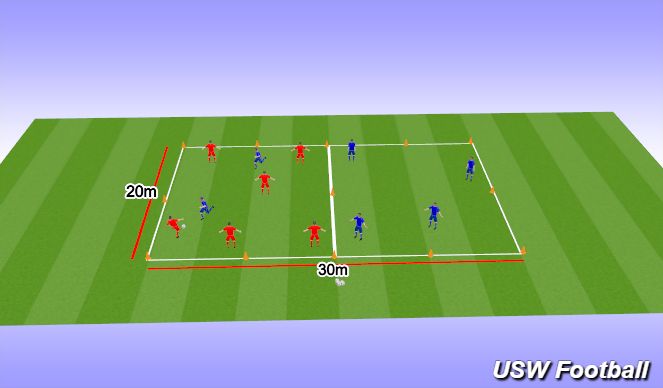Football/Soccer Session (Moderate): 50 Pass Game

Profile Summary

| Name: | Luke Bayliss |
|---|---|
| City: | Bristol |
| Country: | United Kingdom |
| Membership: | Adult Member |
| Sport: | Football/Soccer |
Description
This variable practice gives players the opportunity to press high and stop the opposition playing out from the back. In possession, players are set a challenge of racing to a certain number of passes in order to win the game (this promotes patience and the opportunity for the press).
Learning Objectives:
1. Can you press individually and as a team?
2. Can you understand how the press changes as the ball moves?
3. Can you win the ball back?

See the guidance at the top of this page to understand why you are not seeing interactive Football/Soccer images.

Learning Objectives

|
Technical - Passing needs to be sharp and accurate to test the defender. Slow passing will make it easier to press and win the ball back. |

|
Tactical - If a player is pressing, the second presser needs to support them to make their life easier and give them a better opportunity to regain the ball. |

|
Physical - Big area so speed and agility is key to ensure the ball can be regained in quick time. |

|
Psychological - Understand when you are going to press and pick your moment. If you're too slow, passes can be accumulated at your expense so be sure you can win that ball before engaging. |

|
Social - Players will be given the role of identifying ways to improve the press and implementing this giving them empowerment and improving their communication skills. |








 Play animation
Play animation Play step-by-step
Play step-by-step Repeat (toggle)
Repeat (toggle) Full Screen
Full Screen Pause
Pause Stop
Stop
Passing Game (15 mins)
Equipment
- Set of footballs, in ball nest
- 2 coloured bibs, separated into teams prior to player arrival
- cones to mark out area
Organisation
- Even sided teams (5v5)
- 2 zones connected, 20x15m each
Using a big area means high speed running is more apparent, changing direction is more important and reaching 80%+ of maximum heart rate can be more achievable.
How to Play?
When the ball enters a zone, the team will aim to achieve a number of passes before the opposition. A player can press the ball and try to win possession for the opposition so they can attempt to reach the target. Passes will continue after each phase of play so players aren't aiming to achieve the number of passes in one go, they will carry on from where they lost possession. First team to the total wins, loser does mini forfeit.
Progressions?
The progressions will be dictated by the feedback from interventions and what is seen in the phase of play.
- Because this session is encouraging winning the ball high up the field, can the presser retain possession when winning the ball? If the defender kicks the ball out of play, the attackers will retain possession.
- Increase the number of people pressing dependent on the success of the passing.
- Attackers are allowed less touches meaning the play speeds up and the need to press quickly increases.
- Raise the number of passes to reach to mean that players are potentially pressing for a longer time and ball retention is key for player rest.
Forfeit Examples?
- Lap of grid
Coaching Points
- Body Shape
- Speed
- Support Press?
Interventions
Throughout this session, the aim will be to use q&a for interventions. Using drive/fly bys, participants will be questioned about performance and how they can develop.
All interventions and coaching will be done through the players. This is so their empowerment is applicated and they have the opportunity to develop the session dependent on where they think the issue is.
Throughout the session, empowerment will be given to the players by allowing them to make decisions on their play, their session and their development. They will be able to set their own challenges, Make their own progressions and identify their own mistakes. As the coach, I will be there to support these players to develop their ideas through question and answer.